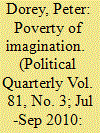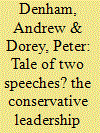|
|
|
Sort Order |
|
|
|
Items / Page
|
|
|
|
|
|
|
| Srl | Item |
| 1 |
ID:
099087


|
|
|
|
|
| Publication |
2010.
|
| Summary/Abstract |
Inequality in Britain today is now so deep that the top 10 per cent own 100 times more than the bottom 10 per cent, yet there is remarkably little public concern or anger about poverty. Indeed, compassion and concern for the poorest in society has actually declined in recent years due to the continued, and even increased, prevalence of the view that poverty is largely caused by laziness and lack of willpower, or is simply an unavoidable fact of modern life. Either way, many people tacitly accept that 'the poor will always be with us'. Moreover, much of the British public believes that there are sufficient opportunities to succeed for those who try hard enough, and also that it is the middle class which actually struggles the most, economically or financially. These assumptions are highly conservative in their ideological and political implications because they limit public support for egalitarianism and extensive wealth redistribution from rich to poor.
|
|
|
|
|
|
|
|
|
|
|
|
|
|
|
|
| 2 |
ID:
092375


|
|
|
|
|
| Publication |
2009.
|
| Summary/Abstract |
Upon becoming Conservative leader, David Cameron, and his Shadow Chancellor, George Osborne, initially sought to compete with Labour by pledging increased expenditure on education and the NHS, and thereby insisting that tax cuts would have to wait. Rather than cutting taxation overall, the emphasis was on restructuring and simplifying Britain's tax system, and shifting the burden towards the better off, mainly thorough promoting environmental taxes. However, the economic collapse at the end of 2008 has prompted the Conservatives to modify this new economic stance, by insisting that they will no longer match Labour's planned increases in public expenditure, but, instead, will increase it at a lower rate. This is intended to reduce the need to increase government borrowing during the recession, and thereby ensure that when the economy recovers, the proceeds of economic growth can be shared between higher public expenditure and lower taxation, rather than being spent on repaying government debt for many years ahead.
|
|
|
|
|
|
|
|
|
|
|
|
|
|
|
|
| 3 |
ID:
070817


|
|
|
|
|
|
|
|